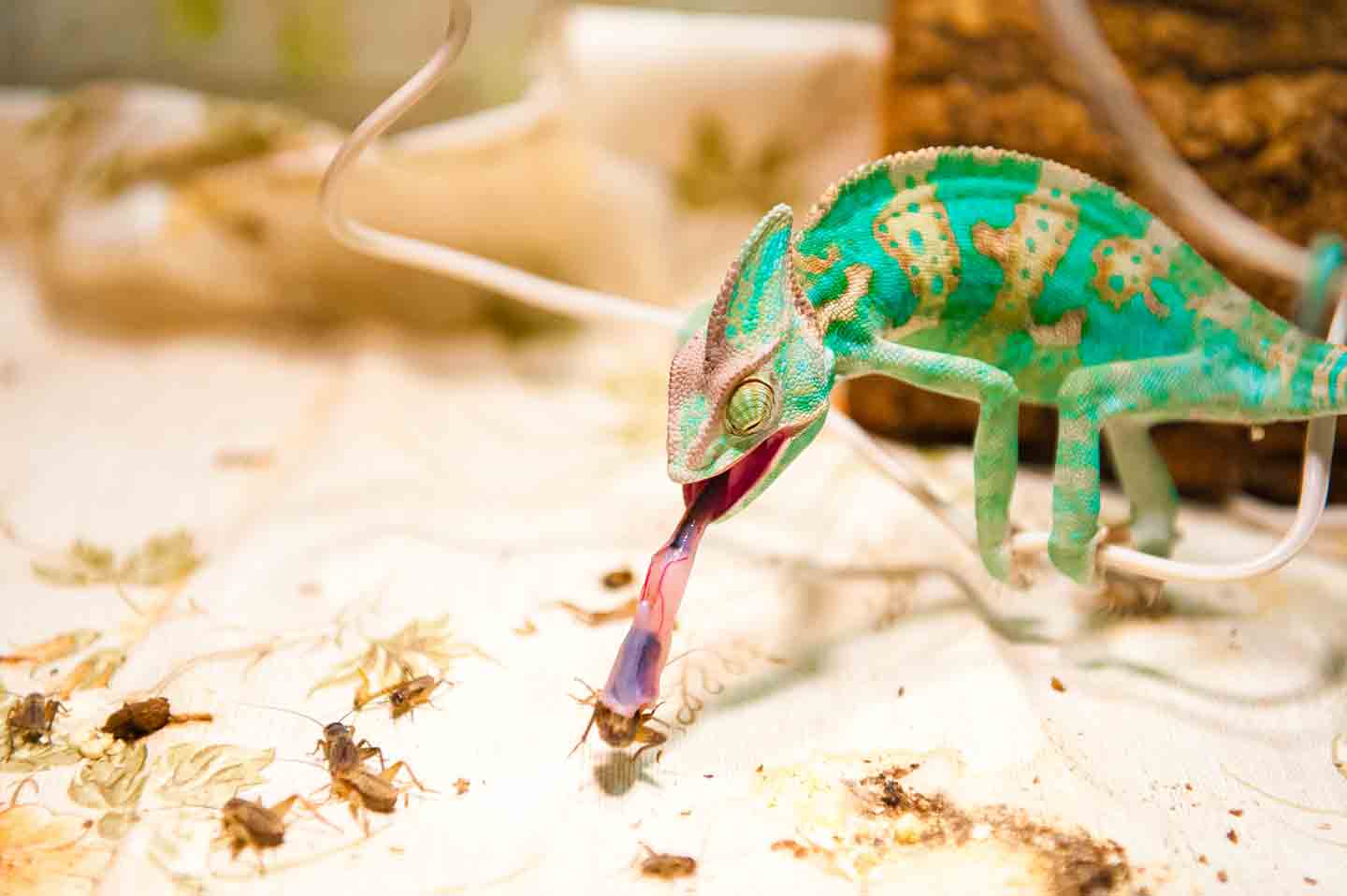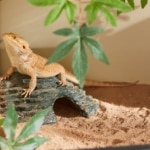What Do Lizards Eat? A Guide to Feeding Your Pet Lizard

Photo by vovashevchuk/Getty
What Do Lizards Eat?
Not every species of lizard eats the same thing. Some companion reptiles are herbivores—meaning they only eat plant matter—while others are carnivores or omnivores who require a diet of animal-based products, too. Even then, not all herbivores eat the same foods, nor do all carnivores or omnivores eat the same things, says Dana Varble, DVM, CAE, the chief veterinary officer for the North American Veterinary Clinic (NAVC) based in Fox Lake, Illinois.
In other words, lizard diets are extremely species-specific. With Dr. Varble’s help, we’re providing a rough guideline on what to feed your pet based on the kind of lizard you have. As always, we recommend speaking with a veterinarian for personalized advice.
Omnivores
- Bearded Dragons: “Bearded dragons can be offered a salad of dark leafy greens—such as collard greens, dandelion greens, turnip and mustard greens—with some vegetables and little fruit, but should also be offered gut-loaded and calcium-dusted insects several times a week,” Dr. Varble says. Dubia roaches are a particular favorite for their nutritional value.
- Blue-Tongued Skinks: While blue-tongued skinks can consume a similar salad to bearded dragons, they tend to thrive on more vegetables and fewer leafy greens alongside juicy insects. They also need other protein sources, such as whole prey like feeder rodents, earthworms and snails/slugs.
- Crested Geckos: Crested geckos are omnivorous lizards who do best on a commercial mashed diet made with both insects and fruit, Dr. Varble says. They can be given insects as well to help supplement their diet. (Hornworms are considered a tasty treat for this species.)
Herbivores
- Green Iguanas: As herbivore lizards, green iguanas do not need—and should not be given—animal protein to eat, Dr. Varble says. “They will eat it, but it isn’t good for them,” she stresses. Instead, they need fresh, dark leafy greens daily, along with some vegetables. Fruit can be given sparingly as a treat.
- Uromastyx: Uromastyx lizards are primarily herbivorous and thrive best on a balanced diet of leafy greens—like collard greens, dandelion greens and mustard greens—and vegetables like squash, bell peppers and carrots. They may enjoy the occasional piece of fruit, too.
Carnivores
- Leopard Geckos: Leopard geckos are considered insectivores, meaning they are a kind of lizard who only eats insects. They require a highly varied diet of feeder insects dusted with a calcium supplement, such as crickets, mealworms, cockroaches, grasshoppers and fruit flies. (Waxworms are a nice occasional treat.)
- Chameleons: This type of lizard is also typically an insectivore. However, their dietary requirements can vary depending on their species and individual preferences. For example, some chameleon species may consume a wider variety of prey items, or may have specific dietary needs based on their natural habitat and behaviors. Talk to your vet about the best diet for your chameleon.
- Nile Monitors: This monitor lizard is less commonly kept as a pet and is best maintained on a diet of whole prey feeder rodents. Think small animal food sources such as mice, rats, gerbils and young chicks.
- Anoles: Anole lizards primarily eat insects like crickets, roaches and mealworms. They may occasionally consume small arachnids and small invertebrates. Providing a varied diet ensures their nutritional needs are met.
What is Gut Loading?
Gut loading involves feeding nutritious foods to insects before offering them to your pet lizard. This is a way to ensure your reptile gets the nutrients they require to thrive. While many omnivorous and carnivorous wild lizards can get the nutrients they need on their own, small lizards kept in captivity often require gut loading.

bayshev/Getty
How Much to Feed Your Lizard
How much you feed a pet lizard depends on the type of lizard and their life stage.
“In general, hatchling and juvenile animals must be fed more often—usually daily until they have reached adulthood,” Dr. Varble says. Once they are no longer baby lizards, you’ll need to adjust your feedings. “Full-grown lizards often need feedings reduced to two to three times weekly, though sometimes less depending on the species,” she adds.
Generally speaking, it’s best to offer appropriately sized foods—usually about the size of the lizard’s head—to avoid overfeeding or choking hazards.
Often, the best lizard pets are species that are voracious eaters in captivity, Dr. Varble says. However, because they’ve got such an appetite, they are prone to being overfed, and becoming overweight or obese. (Species that are particularly notorious for this are bearded dragons and blue-tongued skinks.) Making sure you’re not overfeeding your pet is crucial in maintaining a healthy weight.
So, how do you know how much food your unique lizard needs? Start by knowing their ideal weight. Your vet can offer guidance on how heavy is just right—and how much weight is too much. If your lizard needs to shed some bulk, your vet can provide dietary advice, too.
Do Lizards Need Vitamins or Supplements?
Many pet lizards benefit from vitamins and supplements. However, this ultimately depends on your kind of lizard, so make sure to check with your veterinarian.
Calcium Supplements
Most lizards benefit from a powdered calcium supplement, such as Zoo Med Repti Calcium with D3 Reptile Supplement.
“Both insects and many vegetables are actually calcium-deficient [foods for lizards] without this additional supplementation,” Dr. Varble notes. “There are few species where no additional calcium is recommended, but those tend to be the exception.”
Weekly Multivitamin
Dr. Varble says a weekly multivitamin supplement is beneficial for most lizards. Some good options include the Rep-Cal Herptivite with Beta Carotene Multivitamin Reptile Supplement and Zoo Med Reptivite with D3 Reptile Vitamin.
“Multivitamins are great to help fill in any vitamin deficiencies that may occur in their diet,” Dr. Varble says. “Some animals tend to be finicky and may only eat certain items, so this extra supplementation can help.”
What Shouldn’t Lizards Eat?
Now that we’ve covered the basics of what to feed your pet lizard, let’s review some foods you should never let them consume.
- Wild-Caught Insects: Insects you find in and around your home and yard shouldn’t be fed to pet lizards. Although it is tempting to offer these, Dr. Varble warns that in most cases pet lizards aren’t able to digest these because the insects in your backyard are different from the insects found in lizards’ natural habitats. Wild insects may also contain parasites or pesticides that can poison your lizard, and some bugs, like lightning bugs, are naturally toxic to lizards.
- Toxic Plants: Some house and yard plants, such as philodendron, ivy and dieffenbachia, are toxic to lizards and can cause digestive issues or poisoning if ingested.
- Processed Foods: Avoid feeding lizards processed foods like bread, crackers or sugary snacks. Reptiles can’t easily digest these, and they also lack the essential nutrients these pets require.
- The Wrong Diet: Different species of lizards have different dietary requirements. Talk to your vet to make sure you’re catering your pet lizard’s meals to their specific needs.
Lizard Diet FAQs
Can leopard geckos eat ants?
Can bearded dragons eat flies?
Do green anoles eat fruit?
What do lizards drink?
What is the preferred diet of a blue-tongued skink?



